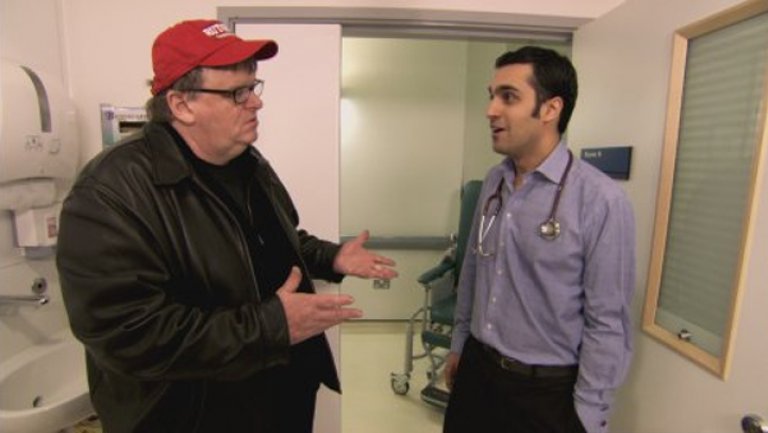Director: Michael Moore,
Watched in: Theater,
Rating: 4/5.
Have you wondered why you hardly ever run into people who’ve moved to the United States from Canada or Europe, especially France and England? Americans are always moving there, but why don’t they move here to take advantage of our low taxes, our rugged individualism, our health insurance? Michael Moore tells us why in his latest documentary, Sicko, an utterly depressing piece of agit prop that not only condemns the privatized health care business in the US but also finds something rotten at the very core of the country.
How is it possible, Moore asks, that in the wealthiest country in the world we are at our most poor in how we take care of each other. Thanks to lobbyists, anti-socialist rhetoric and back-door political deals, the US has a health care system that actually rewards CEOs and administrators for denying people medical care. The fewer mammograms, cholesterol exams, diabetes tests, etc. that a hospital performs means a fatter bottom line for insurance companies and HMOs and, this being America, where greed trumps every other motivation, that is a good thing.
By the end of Sicko, you’ll either revoke your citizenship and move to Paris, or you’ll do exactly what the powers that be want us to do, retreat even more into a fetal cocoon of paralysis. The most alarming theory that Moore offers is the idea that a populace locked into a cycle of debt, work, and fear has neither the time nor the will to change the system, especially when their elected leaders continually betray them. Are you depressed yet?
Moore does his best to keep things moving along with his usual mixture of cheesy stock footage and outrageous clips of George Bush acting like the moron that he is; and Moore has no trouble finding regular Joes who have been royally screwed by insurance companies. For contrast, he takes us to Europe, where British doctors are rewarded by their government-run health care system for making people healthier rather than sicker, and French families and ex-pats live a fine and full life working only 35 hours a week, safe in the knowledge that if they get sick, they will get free, no-strings-attached help.
Of course, Moore cherry picks among the facts and figures to support his thesis, and his final sequence, in which a group of sickened rescuers who worked the rubble after 9/11 are taken to Cuba to get the medical care denied to them by their own country, is so blatant as a stunt that it almost negates the importance of his message. But that is part of Moore’s finger-in-the-eye style. No matter how obvious his set-ups are, no matter how much he glosses over the facts that don’t support his particular realities, there is no denying the truth that is on the screen.
Sicko, like Moore’s Bowling for Columbine and Fahrenheit 911, is another vital page in this filmmaker’s heartfelt and even poignant crusade to remind us all of how great our country once said it wanted to be, and how we’re allowing greed and power to erode that greatness. As a filmmaker, Moore is cheeky and cloying and vague and mostly artless, but as a patriot who loves America, he is beyond reproach.

